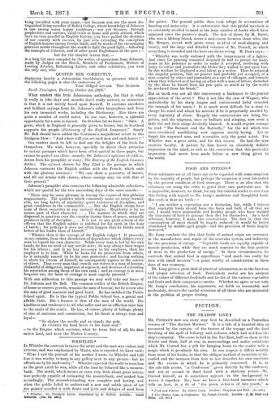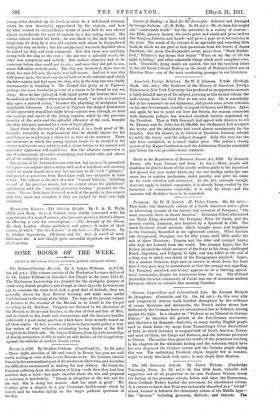FICTION.
THE SHADOW LINE.t Ma. CONRAD'S new sea story may best be described as a Conradian version of " The Ancient Mariner." It is a tale of a haunted ship as recounted by the captain—of the terrors of the voyage and the final breaking of the spell of lethargy and sickness which had stricken the ship's company. The scene is laid in the Far East, half on shore in the Straits and Siam, half at sea, in surroundings and under conditions which Mr. Conrad has a gift for bringing home to the reader with a magic which is peculiarly his own. In one respect it differs notably from most of his books, in that the oblique method of narration is dis- carded and the narrator from first to last describes his own emotions and th3 events in which he is primarily concerned. It is, as the sub-title avows, " a Confession " given directly by the confessor, and not at second or third hand with a shadowy person—Mr. Conrad himself, as it sometimes appears—in the background to weave it together. No ; hero we have a first-hand narrative which tells us how, in a fit of " the green sickness of late youth," a • Food and Fitness. By James Long. London : Chapman and Hal]. [Ss. net.]
t The Shadow Line: a Confession. By Joseph Conrad. London : J. M. Dent and
Sons. neLl
young sailor chuoked up his berth as mate on a well-found steamer, where he was thoroughly appreciated by his captain, and how by what seemed an extraordinary stroke of good luck he was offered almost immediately the post of captain on a fine sailing vessel His elation almost turned his head ; he was blind to the dark hints and misgivings let drop by a wise old captain with whom he foregathered during his stay on shore ; but his complacency was soon dispelled when he joined his ship and took command. Not that there was anything wrong with the ship or the crew ; the one was a splendid vessel, the other was competent and orderly. But endless obstacles had to be overcome before they could put to sea ; and once they did put to sea, worse difficulties were in store. The ship was bewitched, there was no wind, the men fell sick, the mate was half insane. And yet it was this half-insane mate, the most convinced believer in the infernal spell which the late captain had laid upon the ship, who in the long run was chiefly instrumental in breaking it. Mr. Conrad has given us in Typhoon perhaps the most wonderful picture of a storm to be found in any sea story. Here he has portrayed with equal power the horrors that can be endured in the tropics when a becalmed vessel, " as idle as a painted ship upon a painted ocean," becomes the plaything of malignant but impalpable influences. Yet, just as in Typhoon the dogged persistence of the apparently stupid but really heroic captain won through, so here the courage and nerve of the young captain, aided by the perverse tenacity of the mate and the splendid efficiency of the cook, brought the ship into port, manned by a crew of loyal ghosts.
Apart from the directness of the method, it is a fresh proof of Mr. Conrad's versatility in impersonation that he should choose for his mouthpiece so headstrong a character as that of the narrator. There are moments in which the young captain seems to be merged in his creator and to take on a subtlety and a vision foreign to his normal and somewhat aggressive self-confidence. But the ultimate impression is one of achievement, of resolve triumphing over fearful odds, and above all of the solidarity of the sea.
The genius of Mr. Conrad disarms criticism, but we may be permitted to express oar surprise that a writer with such a fastidious and unerring choice of words should have lent his sanction to the verb "glimpse," and passed a quotation from Baudolaire with two misprints in nine words. The volume is the first of a new " Conrad Library," including several of his previous novels, but we cannot share th3 publishers' satisfaction with the "specially attractive binding" prepared for the series. Messrs. Dent have deserved so well of the public in this respect that they must not complain if they are judged by their own high standard.



























 Previous page
Previous page